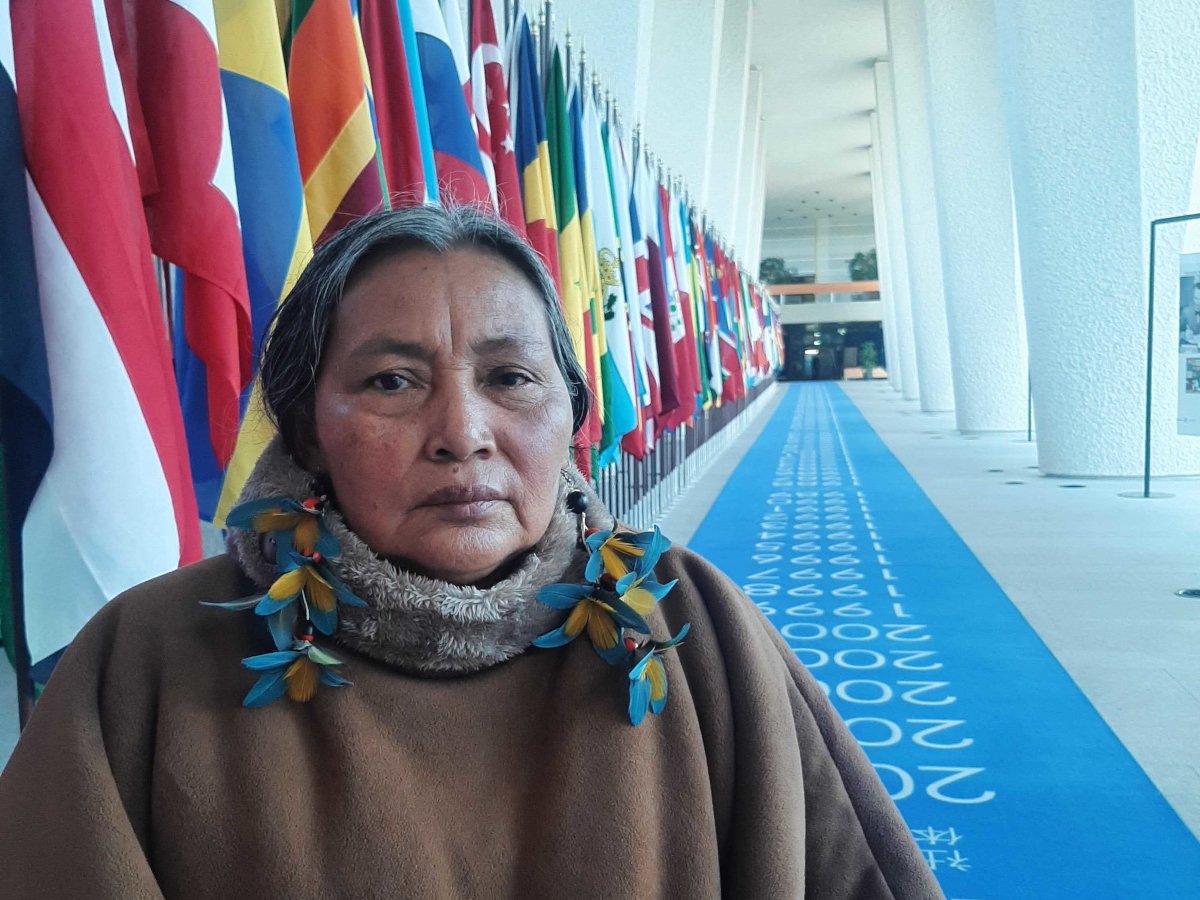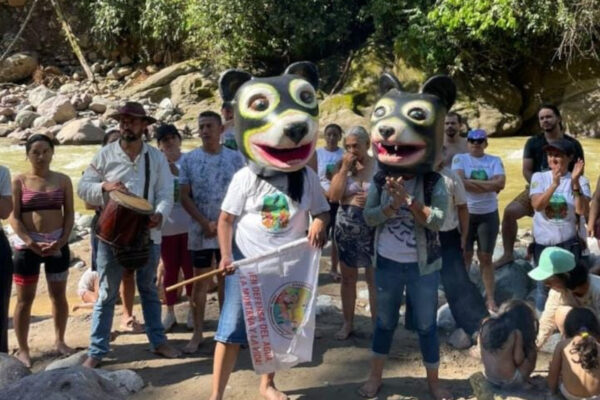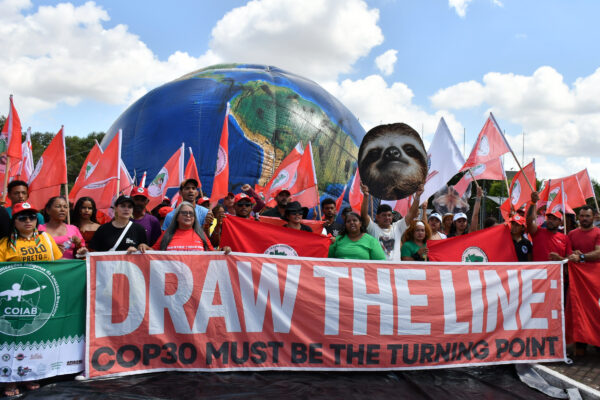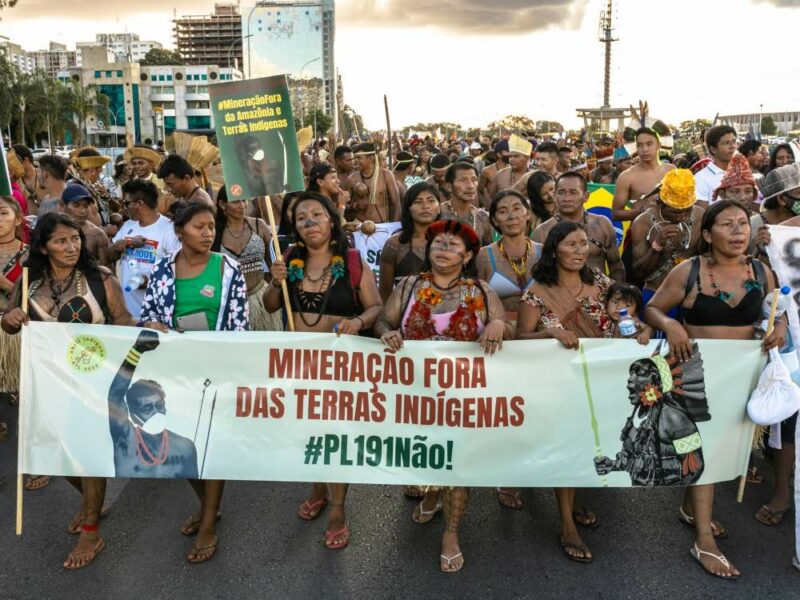In the past two decades, economic and financial ties between China and Latin American nations have deepened to an unprecedented extent. Unfortunately, some of these investments have left behind human rights violations and environmental impacts in the Ecuadorian Amazon. Chinese financial institutions have become the principal creditors of several governments in Latin America, and Chinese corporations, most of them government-owned, have led over 200 infrastructure projects in 20 countries in the region, investing an estimated $172 billion. From February 15-16, representatives of NGOs and civil society leaders traveled to Geneva to expose the rights violations and impacts of these projects on local and Indigenous communities, including outgoing Shuar Arutam President Josefina Tunki – a powerful advocate for Indigenous rights and the Amazon.
Josefina Tunki was elected the first woman representative of the Shuar Arutam people and has been resisting the advance of mining companies in her territory since she was a child. Because of her successful work as an Earth Defender, she has experienced numerous threats and constant persecution. The Shuar Arutam People have filed several national and international legal actions to defend their territory from mining, largely led by the strategic vision of Josefina. Most recently, in December 2022, thanks to this legal strategy, the Constitutional Court of Ecuador recognized that the San Carlos Panantza copper mining project operated by the Chinese company Explorcobres (EXSA) violated the Shuar Arutam People’s right to Free, Prior, and Informed consultation. Due to this victory, and on behalf of the region’s Indigenous peoples, she joined the delegation.
Our presence was vital and productive. During a recommendations discussion with China, Josefina was the only voice representing Indigenous peoples, and she delivered powerful testimony.
“For caring for our territory and conserving our ways of life, we are subjected to constant persecution. They chase us with drones, they hack our social networks, they call us to intimidate us,” she testified. “The Shuar Arutam People have already decided and have declared forcefully that we do not want mining or consultation in our territory.”
“We are aware that this is also the responsibility of the Chinese state, and that China, by allowing its companies to violate the rights of indigenous peoples, has not complied with its international obligations,” she concluded.
Civil society actors have responded to the expansion of Chinese corporate and financial activities by increasing their advocacy and oversight, warning that where Chinese operations take place, destruction follows. We played a vital role in the development of this delegation with the collective of Latin American civil society groups analyzing China’s operations abroad (CICDHA), assembling reports for the assessment of China before the experts of the Committee on Economic, Social and Cultural Rights, and coordinating the advocacy delegation representing nine countries of the region. The International Service for Human Rights supported the delegation.
Alongside affected communities, Josefina Tunki and the Shuar Arutam are using the mechanisms available to them at the United Nations to demand change. Otherwise, it is difficult for civil society to directly hold Chinese banks and corporations to account because there are few other communications channels and processes to file claims or seek reparations for communities available. Still, there is hope. Long-term mobilization and reporting by CICDHA prompted discussions at the UN level, by special rapporteurs, the Business and Human Rights Working Group, and governments throughout China’s Universal Periodic Review (UPR) cycle. Each UN member nation faces a Universal Periodic Review of its human rights record every four and a half years. Experts agree: the Chinese government has not made sufficient efforts to adequately comply with its international human rights obligations regarding the actions of corporate and financial actors under their jurisdiction outside China’s borders.
Josefina also met with the Office of the High Commissioner of the United Nations, specifically with the technical team of the rapporteurs of toxic waste, environment, and human rights defenders; UN officials representing Venezuela, Ecuador, Peru, Colombia, Brazil, and Argentina.
Last week, the working group resumed its review of China, taking a closer look at China’s obligations to protect socio-economic rights where it conducts business, which prompted the Latin American delegation. The committee experts will soon provide their observations and recommendations based on discussions with the Chinese Government and documentation from civil society. This United Nations process allows for a thorough analysis of China’s behavior and its impact on social, economic, and cultural rights.
Amazon Watch joined 22 Latin American and international organizations in submitting a report to the working group which exposes in detail 14 projects in which corporate and financial actors under China’s jurisdiction have failed to comply with international human rights, labor, and environmental standards.
These ventures span nine Latin American countries – Argentina, Bolivia, Brazil, Chile, Colombia, Ecuador, Mexico, Peru, and Venezuela – in sectors including mining, hydroelectric power, fossil fuel projects, infrastructure, and agriculture. The report identifies patterns of serious abuses against the rights of Indigenous peoples, including the rights to health, a healthy environment, water, food, housing, and labor rights, as well as various civil and political rights.
The trip also served to deepen our strategies and build relationships with delegations from other continents and international NGOs working to hold countries accountable for their impact on other countries. Together, we discussed possible future strategies to strengthen our collective advocacy against transnational corporations violating human rights in Latin America and other regions of the world.
The delegation was a catalyst for our future international advocacy efforts. We are now preparing to use strategic United Nations tools to hold governments responsible for Indigenous rights violations to account. In this next phase, we’re excited to share updates with you and outcomes from our growing international work!














